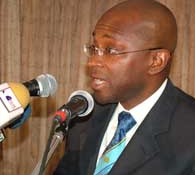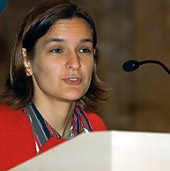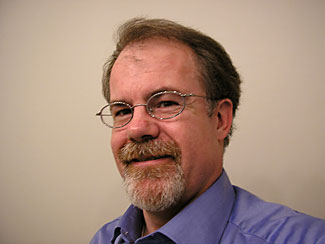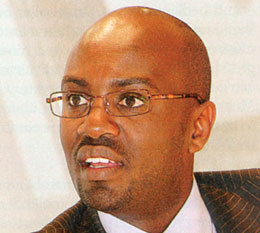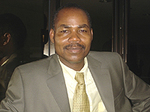UPDATE 12 noon: this is a dueling oped with Sachs on ft.com, debate has moved on and even some agreement (see end of post) from a column in the on-line Financial Times today ; for ungated access and a picture of the handsome author go here.
The Millennium Development Goals tragically misused the world’s goodwill to support failed official aid approaches to global poverty and gave virtually no support to proven approaches. Economists such as Jeffrey Sachs might argue that the system can be improved by ditching bilateral aid and moving towards a “multi-donor” approach modelled on the Global Fund to Fight Aids, Tuberculosis and Malaria. But current experience and history both speak loudly that the only real engine of growth out of poverty is private business, and there is no evidence that aid fuels such growth.
Of the eight goals, only the eighth faintly recognises private business, through its call for a “non-discriminatory trading system”. This anodyne language refers to the scandal of rich countries perpetuating barriers that favour a tiny number of their businesses at the expense of impoverished millions elsewhere. Yet the trade MDG received virtually no attention from the wider campaign, has seen no action, and even its failure has received virtually no attention in the current MDG summit hoopla.
This is all the more misguided because trade-fuelled growth not only decreases poverty, but also indirectly helps all the other MDGs. Yet in the US alone, the violations of the trade goal are legion. US consumers have long paid about twice the world price for sugar because of import quotas protecting about 9,000 domestic sugar producers. The European Union is similarly guilty.
Equally egregious subsidies are handed out to US cotton producers, which flood the world market, depressing export prices. These hit the lowest-cost cotton producers in the global economy, which also happen to be some of the poorest nations on earth: Mali, Burkina Faso and Chad.
According to an Oxfam study, eliminating US cotton subsidies would “improve the welfare of over one million West African households – 10 million people – by increasing their incomes from cotton by 8 to 20 per cent”.
Brahima Outtara, a small cotton farmer in Logokourani, Burkina Faso, described the status quo to the aid agency a few years ago: “Cotton prices are too low to keep our children in school, or to buy food and pay for health.”
To be fair, the US government has occasionally tried to promote trade with poor countries, such as under the African Growth and Opportunity Act, a bipartisan effort over the last three presidents to admit African exports duty free. Sadly, however, even this demonstrates the indifference of US trade policy towards the poor.
The biggest success story was textile exports from Madagascar to the US – but the US kicked Madagascar out of the AGOA at Christmas 2009. The excuse for this tragic debacle was that Madagascar was failing to make progress on democracy; an odd excuse given the continued AGOA eligibility of Cameroon, where the dictator Paul Biya has been in power for 28 violent years. Angola, Chad and even the Democratic Republic of the Congo are also still in. The Madagascan textile industry, meanwhile, has collapsed.
In spite of all this, the great advocacy campaign for the millennium goals still ignores private business growth from trade, with a few occasional exceptions such as Oxfam. The burst of advocacy in 2005 surrounding the Group of Eight summit and the Live 8 concerts scored a success on the G8 increasing aid, but nothing on trade.
The UN has continuously engaged US private business on virtually every poverty-reducing MDG except the one on trade that would reduce poverty-increasing subsidies to US private business. And while the UN will hold a “private sector forum” on September 22 as part of the MDG summit, the website for this forum makes no mention of rich country trade protection.
The US government, for its part, announced recently its “strategy to meet the millennium development goals”. The proportion of this report devoted to the US government’s own subsidies, quotas and tariffs affecting the poor is: zero. News coverage reflects all this – using Google News to search among thousands of articles on the millennium goals over the past week, the number that mention, say, “cotton subsidies” or “sugar quotas” is so far: zero.
It is already clear that the goals will not be met by their target date of 2015. One can already predict that the ruckus accompanying this failure will be loud about aid, but mostly silent about trade. It will also be loud about the failure of state actions to promote development, but mostly silent about the lost opportunities to allow poor countries’ efficient private businesspeople to lift themselves out of poverty
UPDATE: this was a dueling piece with an oped by Sachs today on FT.com.
One of us also got a prestigious slot in the print edition of FT :>)
Surprising new agreement with Sachs, where he says:
{Bilateral aid doesn't work because it's} "largely unaccountable," "programmes are scattered among many small efforts," {and it creates mainly an} "endless spectacle of visiting dignitaries from donor countries."
Continuing disagreement with Sachs when he says:
The most exciting example {of success} is the Global Fund to Fight Aids, TB and Malaria. ...while a decade ago all three diseases were running out of control, now all are being reined in with millions of lives saved.
Jeff, could you clarify a bit what you mean saying that AIDS is "being reined in" when for every 100 people added to AIDS treatment, 250 people are newly infected with HIV?
 From Aid to Equality
From Aid to Equality


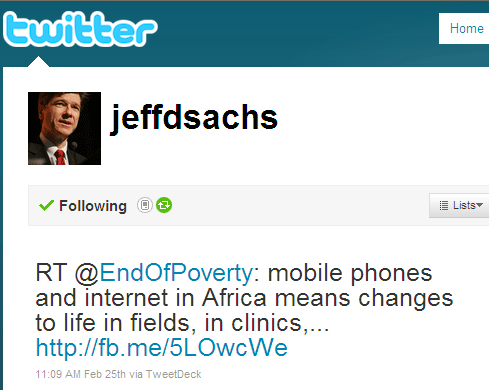

 On correcting stereotypes, consider the Willie Horton ad of the presidential election of 1988 of the George Bush, Sr. vs. Michael Dukakis. A political group allied with Bush ran an ad featuring a scary picture of Willie Horton (see also the
On correcting stereotypes, consider the Willie Horton ad of the presidential election of 1988 of the George Bush, Sr. vs. Michael Dukakis. A political group allied with Bush ran an ad featuring a scary picture of Willie Horton (see also the 